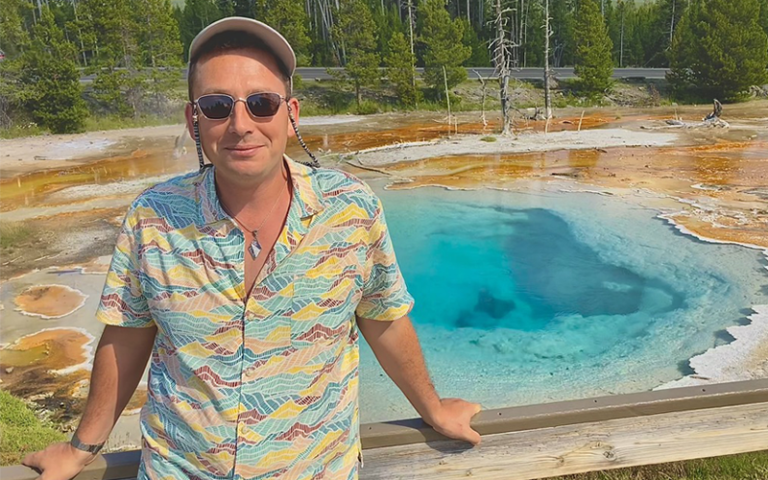Alex Black is a Culture, Communication and Media EdD student, class of 2025. He talks to us about his experience studying at IOE.
 You participated in a mobility programme with the Universidad Autónoma de Benito Juárez de Oaxaca in Mexico, what was the experience like and what did you learn?
You participated in a mobility programme with the Universidad Autónoma de Benito Juárez de Oaxaca in Mexico, what was the experience like and what did you learn?

Transformative. The university is based in an area with one of the most diverse language ecologies in the world, with 15 distinct Indigenous languages and 176 mutually unintelligible variants. For an educational linguist, it is a goldmine.
The institution itself is also pretty unique: its namesake and most famous alumnus, Benito Juárez, was the first Indigenous president in the Americas and a symbol of racial justice in Mexico. The university honours this radical history with a strong social justice agenda, where the rector and heads of faculty are elected by the student body. As a result, there is an unusually non-hierarchical dynamic between students and staff – with most undergraduate students taking on teaching or administrative work towards the end of their degree.
My course in critical pedagogy resulted in my students producing a piece of immersive theatre ‘False Friends,’ which was presented around the campus and attended by around 100 students. The students there offered me a unique insight into the nuanced challenges faced by Indigenous-rooted students in accessing education and valuing their language and knowledge systems.
“Most importantly, perhaps, I also learnt of the power of research undertaken alongside students rather than upon them.
You were awarded funding as part of the Turing Scheme, can you tell us about how this contributed to your studies and your practice?
I come from a low-income household and work in education, so the past two years have been a real struggle financially. Funding from the Turing Scheme enabled me to undertake impactful, international research which would otherwise never have taken place.
My initial research adopted a very positivist paradigm – by this I mean that there was no way of taking into account the lived experience of students. Instead, I was relying on statistics provided by large institutions and interviews with overwhelmingly white, Anglo-Saxon educators.
“Working with trainee language teachers from Indigenous backgrounds in Oaxaca offered a unique insight into the mechanics of language anxiety and internal colonisation in this part of the world.
It has suggested entirely new avenues for research, including linguistic relativity – specifically, the idea that languages have a significant effect on the way we build relationships with one another. Most educators don’t have the time to reflect on these things, but as English continues to develop as a global lingua franca, we need to consider the impact that has on how we relate to one another. A few months after finishing Turing, I decided to move permanently to Oaxaca and am so grateful for the opportunities it has offered.
You did both a PG Dip and an EdD at IOE. What did your journey to IOE look like, and why did you choose to study here?
The transition from PG Dip to EdD was not an easy one. It’s an intensive and challenging course. Only a handful of us made it through to the end! Both programmes are designed for mature students who may work or have caring responsibilities. They are flexible and allow for the fact that sometimes participants may be unable to attend in-person. I chose this route into an EdD because I wanted to feel part of the university and meet people face-to-face, but I knew this would become more difficult from the second year onwards.
“The IOE itself is of course a world-class institution. I am grateful to have such easy access to a network of leading academics in my field.
Staff have helped open doors to me, which would never otherwise have been within reach – and the Turing Scheme is just one example of that.
What was the best part of your degree and time at UCL, and how did it shape your career?
Perhaps one of the nicest experiences has been attending conferences. At the first academic conference I attended, I felt incredibly nervous about giving my first paper. Then, I realised there were other IOE students and staff attending the same conference. I went to all of their sessions, and they very kindly came to mine. My paper was still pretty underwhelming, but it was great to have a social safety net to fall back on!
“The last conference I attended, there were three other students from the same year of my EdD programme – and we felt like a real team.
I now try to plan ahead for conferences and try to present alongside others. It’s a really important part of academia and networking. It’s also the best moment to push yourself to develop your thinking on a subject.
Listen to Alex talk about his research at the Centre for Doctoral Education Conference 2023.
Read the transcript.
Tell us about your field of study. What do you find interesting about it and what inspires you?
My field of study is educational linguistics.
“Language is our oldest and most powerful technology. We need only think of the impact of Large Language Models like ChatGPT to remind ourselves of the ways in which we are constantly and radically innovating its use.
As language teachers, we have a unique opportunity to empower our students, and I continue to be humbled by their gratitude. All too often, we lack a critical lens when we approach this field of research. In fact, it was only last year that an academic journal was finally launched to cover this specific discipline – by Professor Li Wei, director of the IOE.
“I am inspired by some of the academic writing I have come across since returning to study. Most inspiring, however, are the observations and revendications of my students here in Oaxaca.I am inspired by some of the academic writing I have come across since returning to study. Most inspiring, however, are the observations and revendications of my students here in Oaxaca.
I feel incredibly lucky to be able to work alongside them in exploring new ways of learning and teaching language use – and pushing new boundaries in intercultural communication. I sincerely hope that IOE and initiatives such as the Turing Scheme will continue to offer these opportunities to others in the future.
Last updated 23 August 2023.
 Close
Close


